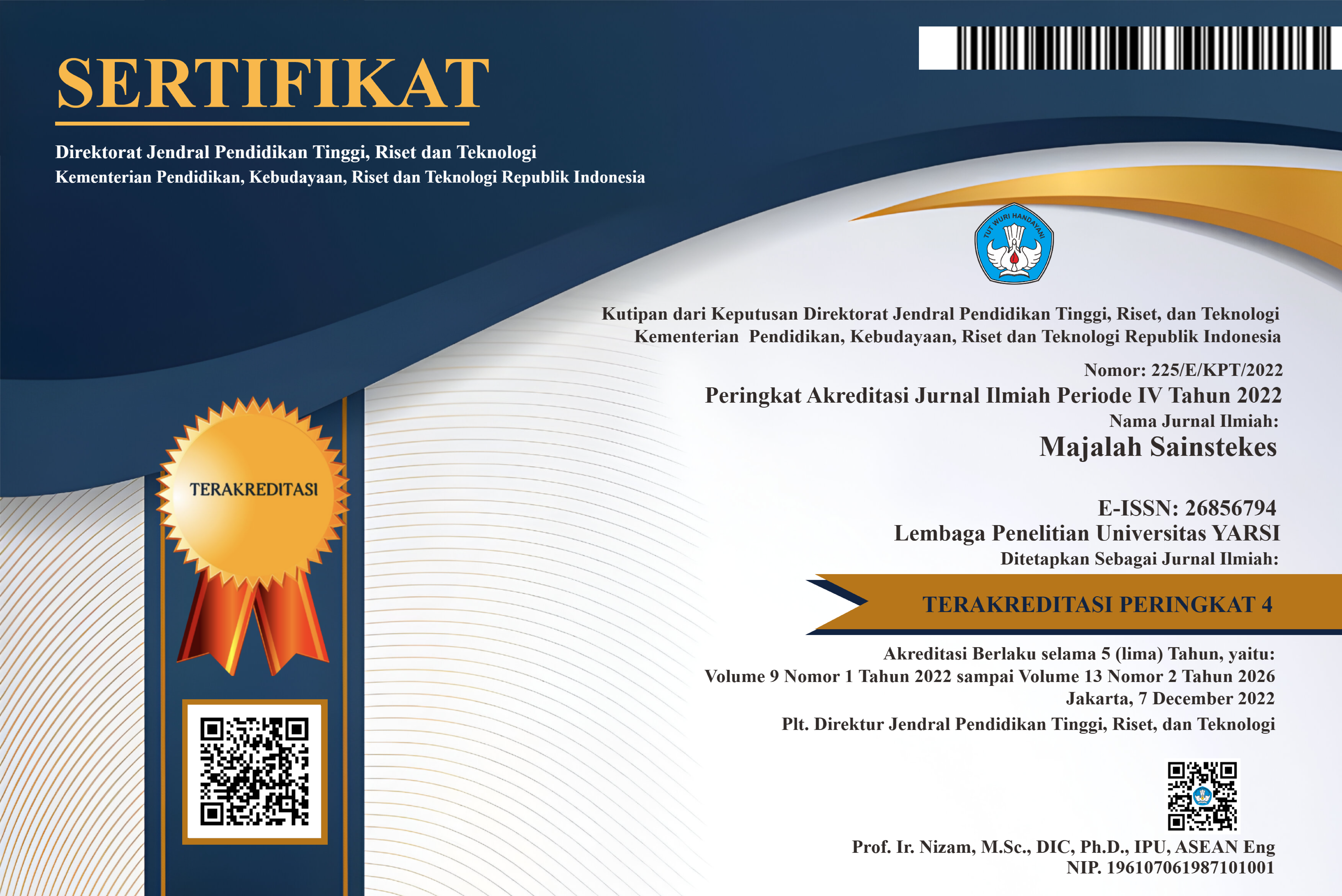PENGARUH LARUTAN SODIUM HIPOKLORIT TERHADAP KEKUATAN TRANSVERSAL PADA BAHAN BASIS GIGI TIRUAN RESIN AKRILIK POLIMERISASI PANAS
Keywords:
Acrylic resin, transverse strength, sodium hypochloriteAbstract
Among various ways to clean the denture based material is by its immersion in disinfectant solution, such as sodium hypochlorite. Heat polymerized acrylic is denture based material that is easily broken because of its low transverse strength. This study was aimed to observe the transverse strength of denture based material heat polymerized acrylic resin after immersion in sodium hypochlorite. This research used 24 samples of heat cured acrylic resin plates measuring 65 mm long, 10 mm wide and 2.5 mm thick. The samples being divided into 4 groups were immersed in sodium hypochlorite 1% and water for 8 hours and 24 hours in 7 days. The transverse strength of acrylic plate were then tested using universal testing machine. The measurement results were statistically analyzed employing “one way ANOVA”. The result showed no significant changes on transverse strength of heat-cured acrylic plate. It was concluded that sodium hypochlorite solution did not provide any significant changes in the transverse strength of heat cured acrylic resin.References
Anusavice KJ. 2003. Philps buku ajar ilmu bahan kedokteran gigi. Ahli bahasa: Budiman JA, Purwoko S.ed 10. Jakarta: Penerbit Buku Kedokteran EGC; .p.197-8
Bath VS, Suhaim KS, Shenoy KK. 2015. Comparative study on effect denture cleanser and disinfectant have on flexural strength on PMMA. IJADS. 1(3):24-26
Chittaranjan B, Taruna, Sudhir, Bharath. 2011. Material and methods for cleaning the dentures. Indian Journal of Dental Advancement. 3 (1): 423-6
Davi LR, Peracini A, Riberio NQ, Soares RB, Silva CHL, Paranhos HFO, Souza RF. 2010. Effect of the physical properties of acrylic resin of overnight immersion in sodium hypochlorite solution. Gerodontology. 27:297-302
Ellakwa AE, El-Sheikh AM. 2006. Effect of chemical disinfectants and repair materials on the transverse strength of repaired heat-polymerized acrylic resin. Journal of prosthodontics. 15 (5):300-5
Ferasima R, Zulkarnain M, Nasution H. 2013. Pengaruh Penambahan Serat Kaca dan Serat Polietilen Terhadap Kekuatan impak dan transversal pada bahan basis gigi tiruan resin akrilik polimerisasi panas. IDJ. 2(1):27-37
Jaber MAR. 2011. Evaluation of the effect of sodium hypochlorite on the transverse strength of acrylic denture base resin. MJD. 8 (1): 29-32
Paranhos HFO, Davi LR, Percini A, Soares RB, Lovato CHS, Souza RF. 2009. Comparison of physical and mechanical propertiesof microwave-polymerized acrylic resin after disinfection in sodium hypochlorite solutions. Braz Dent J. 20(4): 331-5
Pavarina AC, Machado AL, Giampalo ET, Vergani CE. 2003. Effects of chemical disinfectants on the transverse strengthof denture base acrylic resins. Journal of Oral Rehabilitation. 30: 1085–89
Peracini A, Davi LR, Ribeiro NQ, Souza RF, Silva CHL, Oliveira Paranhos HF. 2010. Effect of denture cleansers on physical properties ofheat-polymerized acrylic resin. Journal of Prosthodontic Research. 54: 78–83
Savabi O, Attar K, Nejatidanesh F, Goroohi H, Badrian H. 2013. Effect of different chemical disinfectants on the flexural strength of heat-polymerized acrylic resins. European Journal of Prosthodontics and Restorative Dentistry. 21(3):105-8
Williams DF, Cunningham J. 1979. Materials in clinical dentistry. New York: Oxford University Press. p.309-10

 Dharma Satya Aprianto
Dharma Satya Aprianto












